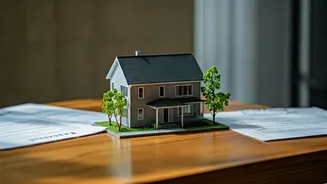Initial Preparations
Before diving into the excitement of house hunting, it is important to lay the groundwork for a smooth process. Start by openly discussing the financial
aspects with all involved parties. Determine who will be contributing, both initially and ongoing. This clarity is crucial to avoid misunderstandings down the road. Consult with legal and financial advisors to structure the ownership in a way that aligns with everyone's needs and future plans. It is better to have everything in writing, as this can prevent future arguments. Consider creating a comprehensive agreement that outlines each person's rights and responsibilities. This should cover financial contributions, maintenance duties, and decision-making processes regarding the property. A well-defined agreement is essential to preventing future disagreements and conflicts.
Legal and Financial
Secure the assistance of qualified legal professionals from the onset of the home-buying process. A lawyer can draft or review any essential agreements, ensuring they accurately reflect the intentions of all the involved parties. Ensure that the property deed clearly reflects the ownership structure. Consider whether it will be joint tenancy with the right of survivorship or tenancy in common. Each option has different implications, especially concerning inheritance and the transfer of ownership. Obtain financial advice from a tax expert to understand the tax implications of the property ownership structure. This is especially important for things like capital gains and property taxes. This advice will help prevent any surprises down the road. All of these measures will contribute to a more secure and transparent ownership experience, significantly reducing the chances of conflict.
Long-Term Considerations
Think about the future while structuring your ownership plan. Consider how life changes might affect the property. This includes events like marriage, divorce, or the addition of new family members. Update any agreements and ownership structures to reflect these changes. Ensure that the original agreements and ownership documentation are regularly reviewed. Make changes as necessary to accommodate evolving circumstances. Create a system for regular communication among all parties involved. Schedule periodic meetings to discuss the property, its maintenance, and any future plans. This will help resolve issues promptly and help prevent escalation of potential problems. Being proactive helps mitigate potential conflicts and promotes a positive living or investment environment.
Open Communication
Maintain a practice of ongoing communication. This is vital to preventing disputes. Hold open and honest conversations about the property, its management, and any related financial matters. Create a shared understanding and agreement on responsibilities and expectations. Encourage all parties to participate in the decision-making process. This will help ensure that everyone feels valued and heard. Be willing to compromise and find solutions that work for everyone. If any disagreements arise, tackle them promptly. Never let small issues fester and grow into bigger problems. Mediation may be a useful tool when resolution becomes challenging. Consider involving a neutral third party to facilitate communication and reach an agreement. By prioritizing clear communication and a collaborative approach, you can create a positive environment, thereby avoiding potential property conflicts and fostering long-term harmonious relationships.













